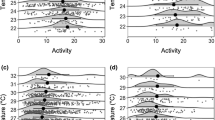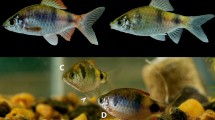Abstract
The environment experienced by a mother can have profound effects on the fitness of her offspring (i.e., maternal effects). Maternal effects can be adaptive when the developmental environments experienced by offspring promote phenotypes that provide fitness benefits either via matching offspring phenotype to the post-developmental environment (also known as anticipatory maternal effects) or through direct effects on offspring growth and survival. We tested these hypotheses in a viviparous lizard using a factorial experimental design in which mothers received either high or low amounts of food during gestation, and resultant offspring were raised on either high or low amounts of food post-birth. We found no effect of food availability during gestation on reproductive traits of mothers or offspring traits at birth. However, offspring from mothers who received low food during gestation exhibited a greater increase in condition in the post-birth period, suggesting some form of priming of offspring by mothers to cope with an anticipated poor environment after birth. Offspring that received low food during gestation were also more likely to die, suggesting a trade-off for this accelerated growth. There were also significant effects of post-birth food availability on offspring snout-vent length and body condition growth, with offspring with high food availability post birth doing better. However, the effects of the pre- and post-natal resource evnironment on offspring growth were independent on one another, therefore, providing no support for the presence of anticipatory maternal effects in the traditional sense.


Similar content being viewed by others
Data accessibility
Data available from Dryad Digital Repository (Botterill-James et al. 2019).
References
Agrawal AA, Laforsch C, Tollrian R (1999) Transgenerational induction of defences in animals and plants. Nature 401:60–63. https://doi.org/10.1038/43425
Badyaev AV, Uller T (2009) Parental effects in ecology and evolution: mechanisms, processes and implications. Philos T Roy Soc B 364:1169–1177. https://doi.org/10.1098/rstb.2008.0302
Bolker BM, Brooks ME, Clark CJ, Geange SW, Poulsen JR, Stevens MHH, White JSS (2009) Generalized linear mixed models: a practical guide for ecology and evolution. Trends Ecol Evol 24:127–135. https://doi.org/10.1016/j.tree.2008.10.08
Botterill-James T, Halliwell B, Cooper-Scott E, Uller T, Wapstra E, While GM (2016) Habitat structure influences parent-offspring association in a social lizard. Front Ecol Evol 4:96. https://doi.org/10.3389/fevo.2016.00096
Botterill-James T, Halliwell B, McKeown S, Sillince J, Uller T, Wapstra E, While GM (2017) Family aggression in social lizard. Sci Rep 7:3502. https://doi.org/10.1038/s41598-017
Botterill-James T, Munch KL, Halliwell B, Chapple DG, Gardner MG, Wapstra E, While GM (2019) Data from: Low food availability during gestation enhances offspring post-natal growth, but reduces survival, in a viviparous lizard. Dryad Digital Repository. https://doi.org/10.5061/dryad.3sk8ht4
Burgess SC, Marshall DJ (2014) Adaptive parental effects: the importance of estimating environmental predictability and offspring fitness appropriately. Oikos 123:769–776. https://doi.org/10.1111/oik.01235
Cadby CD, Jones SM, Wapstra E (2011) Potentially adaptive effects of maternal nutrition during gestation on offspring phenotype of a viviparous reptile. J Exp Biol 214:4234–4239. https://doi.org/10.1242/jeb.057349
Caley MJ, Schwarzkopf L (2004) Complex growth rate evolution in a latitudinally widespread species. Evolution 58:862–869. https://doi.org/10.1111/j.0014-3820.2004.tb00417.x
Cartledge VA, Jones S (2007) Does adrenal responsiveness vary with sex and reproductive status in Egernia whitii, a viviparous skink? Gen Comp Endoc 150:132–139. https://doi.org/10.1016/j.ygcen.2006.07.021
Chapple DG (2003) Ecology, life-history, and behavior in the Australian scincid genus Egernia, with comments on the evolution of complex sociality in lizards. Herpetol Monogr 17:145–180
Chapple DG, Keogh JS (2006) Group structure and stability in social aggregations of White’s skink, Egernia whitii. Ethology 112:247–257. https://doi.org/10.1111/j.1439-0310.2006.01153.x
Doody SJ, Guarino E, Georges A, Corey B, Murray G, Ewert M (2006) Nest site choice compensates for climate effects on sex ratios in a lizard with environmental sex determination. Evol Ecol 20:307–330. https://doi.org/10.1007/s10682-006-0003-2
English S, Fawcett TW, Higginson AD, Trimmer PC, Uller T (2016) Adaptive use of information during growth can explain long-term effects of early life experiences. The Am Nat 187:620–632. https://doi.org/10.1086/685644
Engqvist L, Reinhold K (2016) Adaptive trans-generational phenotypic plasticity and the lack of an experimental control in reciprocal match/mismatch experiments. Methods Ecol Evol 7:1482–1488. https://doi.org/10.1111/2041-210X.12618
Gluckman PD, Hanson MA, Cooper C, Thornburg KL (2008) Effect of in utero and early-life conditions on adult health and disease. New Engl J Med 359:61–73. https://doi.org/10.1056/NEJMra0708473
Groothuis TGG, Taborsky B (2015) Introducing biological realism into the study of developmental plasticity in behaviour. Front Zool 12(Suppl):1. https://doi.org/10.1186/1742-9994-12-S1-S6
Gvodzik L (2002) To heat or to save time? Thermoregulation in the lizard Zootoca vivipara (Squamata: Lacertidae) in different thermal environments along an altitudinal gradient. Can J Zool 80:479–492. https://doi.org/10.1139/z02-015
Hales CN, Barker DJ (2001) The thrifty phenotype hypothesis. Brit Med Bull 60:5–20
Halliwell B, Uller T, Chapple DG, Gardner MG, Wapstra E, While GM (2017) Habitat saturation promotes delayed dispersal in a social reptile. Behav Ecol 28:515–522. https://doi.org/10.1093/beheco/arw181
Hopwood PE, Moore AJ, Royle NJ (2014) Effects of resource variation during early life and adult social environment on contest outcomes in burying beetles: a context-dependent silver spoon strategy? P Roy Soc B-Biol Sci 281:20133102. https://doi.org/10.1098/rspb.2013.3102
Itonaga K, Jones SM, Wapstra E (2012) Effects of maternal basking and food quantity during gestation provide evidence for the selective advantage of matrotrophy in a viviparous lizard. PLoS ONE 7:e41835. https://doi.org/10.1371/journal.pone.0041835
Kelly D, Coutts A (2000) Early nutrition and the development of immune function in the neonate. P Nutr Soc 59:177–185. https://doi.org/10.1017/S0029665100000197
Kofman O (2002) The role of prenatal stress in the etiology of developmental behavioural disorders. Neurosci Biobehav R 26(4):457–470
Kotrschal A, Heckel G, Bonfils D, Taborsky B (2012) Life-stage specific environments in a cichlid fish: implications for inducible maternal effects. Evol Ecol 26:123–137. https://doi.org/10.1007/s10682-011-9495-5
Kotrschal A, Szidat S, Taborsky B (2014) Developmental plasticity of growth and digestive efficiency in dependence of early-life food availability. Funct Ecol 28:878–885. https://doi.org/10.1111/1365-2435.12230
Marshall DJ, Uller T (2007) When is a maternal effect adaptive? Oikos 116:1957–1963. https://doi.org/10.1111/j.2007.0030-1299.16203.x
Metcalfe NB, Monaghan P (2001) Compensation for a bad start: grow now, pay later? Trends Ecol Evol 16:254–260. https://doi.org/10.1016/S0169-5347(01)02124-3
Mousseau TA, Dingle H (1991) Maternal effects in insect life histories. Annu Rev Entomol 36:511–534. https://doi.org/10.1146/annurev.en.36.010191.002455
Mousseau TA, Fox CW (1998) The adaptive significance of maternal effects. Trends Ecol Evol 13:403–407. https://doi.org/10.1016/S0169-5347(98)01472-4
Muller W, Groothuis TGG, Kasprzik A, Dijkstra X, Alatalo RV, Siitari H (2005) Prenatal androgen exposure modulates cellular and humoral immune function of blackheaded gull chicks. Proc R Soc Lond B Biol Sci 272:1971–1977. https://doi.org/10.1098/rspb.2005.3178
Peig J, Green AJ (2009) New perspectives for estimating body condition from mass/length data: the scaled mass index as an alternative method. Oikos 118:1883–1891. https://doi.org/10.1111/j.1600-0706.2009.17643.x
Peig J, Green AJ (2010) The paradigm of body condition: a critical reappraisal of current methods based on mass and length. Funct Ecol 24:1323–1332. https://doi.org/10.1111/j.1365-2435.2010.01751.x
Räsänen K, Kruuk L (2007) Maternal effects and evolution at ecological time-scales. Funct Ecol 21:408–421. https://doi.org/10.1111/j.1365-2435.2007.01246.x
Rossiter M (1996) Incidence and consequences of inherited environmental effects. Annu Rev Ecol Syst 27:451–476. https://doi.org/10.1146/annurev.ecolsys.27.1.451
Rutkowska J, Cichoń M (2002) Maternal investment during egg laying and offspring sex: an experimental study of zebra finches. Anim Behav 64:817–822. https://doi.org/10.1006/anbe.2002.1973
Segers FHID, Berishvili G, Taborsky B (2012) Egg size-dependent expression of growth hormone receptor accompanies compensatory growth in fish. Proc Roy Soc B-Biol Sci 279:592–600. https://doi.org/10.1006/anbe.2002.1973
Shine R, Downes SJ (1999) Can pregnant lizards adjust their offspring phenotypes to environmental conditions? Oecologia 119:1–8
Taborsky B (2006) Mothers determine offspring size in response to own juvenile growth conditions. Biol Lett 22:225–228. https://doi.org/10.1098/rsbl.2005.0422
Taborsky B (2017) Developmental plasticity: Preparing for life in a complex world. Adv Stud Behav 49:49–99. https://doi.org/10.1016/bs.asb.2016.12.002
Telemeco RS, Elphick MJ, Shine R (2009) Nesting lizards (Bassiana duperreyi) compensate partly, but not completely, for climate change. Ecology 90:17–22. https://doi.org/10.1890/08-1452.1
Uller T (2008) Developmental plasticity and the evolution of parental effects. Trends Ecol Evol 23:432–438. https://doi.org/10.1016/j.tree.2008.04.005
Uller T, While GM, Cadby CD, Harts A, OʼConnor K, Pen I, Wapstra E (2011) Altitudinal divergence in maternal thermal effects in a viviparous lizard is concordant with patterns of behavioural thermoregulation and natural selection on offspring phenotype. Evolution 65:2313–2315. https://doi.org/10.1111/j.1558-5646.2011.01303.x
Uller T, Nakagawa S, English S (2013) Weak evidence for anticipatory parental effects in plants and animals. J Evol Biol 26:2161–2170. https://doi.org/10.1111/jeb.12212
Wade MJ (1998) The evolutionary genetics of maternal effects. In: Mousseau T, Fox C (eds) Maternal effects as adaptations. Oxford University Press, Oxford, pp 5–21
Wang Y, Li SR, Zeng ZG, Liang L, Du WG (2017) Maternal food availability affects offspring performance and survival in a viviparous lizard. Funct Ecol 31:1950–1956. https://doi.org/10.1111/1365-2435.12903
Wapstra E, Swain R, Jones SM, O’Reilly J (1999) Geographic and annual variation in reproductive cycles in the Tasmanian spotted snow skink, Niveoscincus ocellatus (Squamata: Scincidae). Aust J Zool 47:539–550. https://doi.org/10.1071/ZO99038
Warner DA, Buckelew AM, Pearson PR, Dhawan A (2015) The effect of prey availability on offspring survival depends on maternal food resources. Biol J Linn Soc 115:437–447. https://doi.org/10.1111/bij.12519
While GM, Wapstra E (2008) Are there benefits to being born asynchronously? Behav Ecol 19:208–216. https://doi.org/10.1093/beheco/arm124
While GM, Uller T, Wapstra E (2009a) Within-population variation in social strategies characterize the social and mating system of an Australian lizard, Egernia whitii. Austral Ecol 34:938–949. https://doi.org/10.1111/j.1442-9993.2009.02002.x
While GM, Uller T, McEvoy J, Wapstra E (2009b) Long-lasting effects of among-but not within-litter timing of birth in a viviparous lizard. Evol Ecol Res 11:1259–1270
While GM, Uller T, Bordogna G, Wapstra E (2014) Promiscuity resolves constraints on social mate choice imposed by population viscosity. Mol Ecol 23:721–732. https://doi.org/10.1111/mec.12618
Wilson S, Swan G (2017) A complete guide to Australian reptiles, 5th edn. New Holland, Sydney
Wolf JB, Wade MJ (2009) What are maternal effects (and what are they not)? Philos T Roy Soc B 364:1107–1115. https://doi.org/10.1098/rstb.2008.0238
Acknowledgements
We thank Tobias Uller for discussion of ideas and detailed comments on earlier versions of the manuscript. The work was funded by the Holsworth Wildlife Research Fund (to TBJ) and the Australian Research Council (grant number DP150102900 to GMW, MGG and DGC). GMW was supported by the Australian Research Council (Grant number DE150100336). All work was carried out with approval from the Animal Ethics Committee at the University of Tasmania (Ethics Approval Number A0015058).
Author information
Authors and Affiliations
Contributions
TBJ, BH, EW, and GMW conceived the ideas and designed methodology with input from all other authors. TBJ, BH, and KM collected the data. TBJ analysed the data. TBJ and GMW led the writing of the manuscript with all authors contributing critically to the drafts and giving final approval for publication.
Corresponding author
Additional information
Communicated by Jean-François Le Galliard.
Rights and permissions
About this article
Cite this article
Botterill-James, T., Munch, K.L., Halliwell, B. et al. Low food availability during gestation enhances offspring post-natal growth, but reduces survival, in a viviparous lizard. Oecologia 189, 611–620 (2019). https://doi.org/10.1007/s00442-019-04349-5
Received:
Accepted:
Published:
Issue Date:
DOI: https://doi.org/10.1007/s00442-019-04349-5




